Music and lyrics
The song focuses on a protagonist called Sam who is evidently being held, along with the track's narrator, in a political prison. Though set in the future, the story is related in the past tense, in a fashion Bowie has described as "future nostalgia... A past look at something that hasn't happened yet". [1] Musically the song is noted for its "ultra-modern new wave guitar/synth sound", [1] as well as for Bowie's use of varispeed vocals to illustrate Sam's downward spiral in the prison hospital – according to NME critics Roy Carr and Charles Shaar Murray, the effect is "as if the narrator of 'All the Madmen' inhabited the world of '1984'". [2]
"Scream Like a Baby" was one of several tracks on Scary Monsters that evolved from pieces Bowie had written years before. It was originally composed in 1973, with different lyrics, as "I Am a Laser" for The Astronettes (Ava Cherry, Geoffrey MacCormack and Jason Guess). [3] Bowie worked on an album for the group but it was eventually dropped, finally surfacing in 1995 as the Ava Cherry album People from Bad Homes; "I Am a Laser" was one of the tracks. [4]
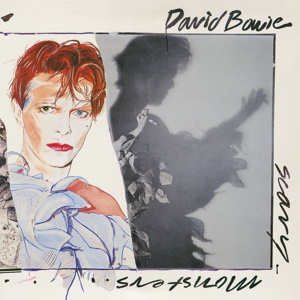
Scary Monsters (and Super Creeps), also known simply as Scary Monsters, is the fourteenth studio album by the English musician David Bowie, released on 12 September 1980 through RCA Records. His first album following the Berlin Trilogy (Low, "Heroes" and Lodger), Scary Monsters was Bowie's attempt at creating a more commercial record after the trilogy proved successful artistically but less so commercially.
The "Alabama Song"—also known as "Moon of Alabama", "Moon over Alabama", and "Whisky Bar"—is an English version of a song written by Bertolt Brecht and translated from German by his close collaborator Elisabeth Hauptmann in 1925 and set to music by Kurt Weill for the 1927 play Little Mahagonny. It was reused for the 1930 opera Rise and Fall of the City of Mahagonny and has been recorded by the Doors and David Bowie.
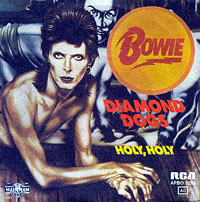
"Diamond Dogs" is a 1974 single by English singer-songwriter David Bowie, the title track of the album of the same name.
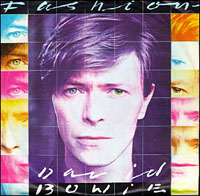
"Fashion" is a song by the English musician David Bowie from his 14th studio album Scary Monsters (1980). Co-produced by Bowie and Tony Visconti and recorded from February to April 1980 at New York and London, it was the last song completed for the album. Originating as a reggae parody titled "Jamaica", "Fashion" is a post-punk, dance and funk track structurally similar to Bowie's "Golden Years". King Crimson guitarist Robert Fripp contributed lead guitar.
"Joe the Lion" is a song by David Bowie in 1977 for the album "Heroes". It was produced by Bowie and Tony Visconti and features lead guitar by Robert Fripp.
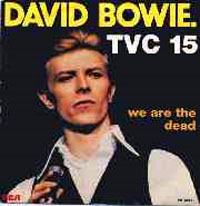
"TVC 15" is a song by the English musician David Bowie, released on his 1976 album Station to Station. RCA Records later released it as the second single from the album on 30 April 1976. The song was recorded in late 1975 at Cherokee Studios in Los Angeles. Co-produced by Bowie and Harry Maslin, the recording featured guitarists Carlos Alomar and Earl Slick, bassist George Murray, drummer Dennis Davis, pianist Roy Bittan and Warren Peace on backing vocals. The upbeat song is mostly art rock performed in a style reminiscent of the 1950s. Lyrically, the song concerns a character's girlfriend being eaten by a television set. It was inspired by a dream of Iggy Pop's and Bowie's role in The Man Who Fell to Earth (1976). Some lyrics are also influenced by the Yardbirds and Kraftwerk.

"Scary Monsters (and Super Creeps)" is a song by the English singer-songwriter David Bowie, released as the title track of his 1980 album Scary Monsters (and Super Creeps). It was also issued as the third single from that album in January 1981. Coming as it did in the wake of two earlier singles from Scary Monsters, "Ashes to Ashes" in August 1980 and "Fashion" in October the same year, NME critics Roy Carr and Charles Shaar Murray labelled its release another instance "in the fine old tradition of milking albums for as much as they could possibly be worth". The song was subsequently performed on a number of Bowie tours.
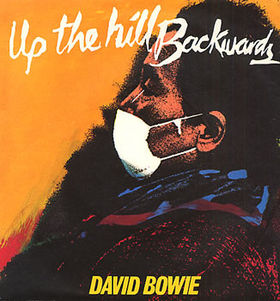
"Up the Hill Backwards" is a song by the English musician David Bowie, released on his 1980 album Scary Monsters . It was later issued by RCA Records as the fourth and final single from the album in March 1981. Originally written under the title "Cameras in Brooklyn", the song was recorded between February and April 1980 at the Power Station in New York City and Good Earth Studios in London. The recording features backing vocalists, guitar contributions from Robert Fripp and acoustic guitar played by co-producer Tony Visconti. Lyrically, the song concerns the struggles of facing a crisis, partially influenced by Bowie's divorce from his wife Angie. Musically, the song contains numerous time signature changes and a Bo Diddley-inspired beat.
"The Width of a Circle" is a song written by the English musician David Bowie in 1969 for his 1970 album, The Man Who Sold the World. Recorded during the spring of 1970, it was released later that year in the United States and in April 1971 in the UK. The opening track on the album, it features hard rock and heavy metal overtones. Bowie had performed a shorter version of the song in concerts for several months before recording it.
"Panic in Detroit" is a song written by the English singer-songwriter David Bowie for the album Aladdin Sane in 1973. Bowie based it on his friend Iggy Pop's descriptions of revolutionaries he had known in Michigan and Pop's experiences during the 1967 Detroit riots. Rolling Stone magazine called the track "a paranoid descendant of the Motor City's earlier masterpiece, Martha and the Vandellas' "Nowhere to Run"".
"Cracked Actor" is a song by the English musician David Bowie, released on his sixth studio album Aladdin Sane (1973). The track was also issued as a single in Eastern Europe by RCA Records in June that year. The song was written during Bowie's stay in Los Angeles during the American leg of the Ziggy Stardust Tour in October 1972. Co-produced by Bowie and Ken Scott, it was recorded in January 1973 at Trident Studios in London with his backing band the Spiders from Mars – comprising Mick Ronson, Trevor Bolder and Woody Woodmansey. A hard rock song primarily led by guitar, the song describes an aging Hollywood star's encounter with a prostitute, featuring many allusions to sex and drugs.
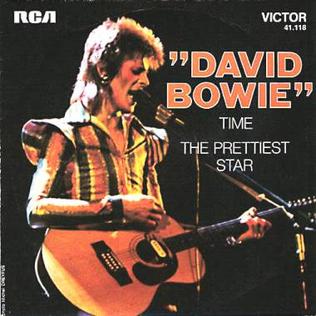
"Time" is a song by the English singer-songwriter David Bowie. Written in New Orleans in November 1972 during the American leg of the Ziggy Stardust Tour, it was recorded in London in January 1973 and released as the opening track on side two of the album Aladdin Sane that April. An edited version of the song supplanted the release of the single "Drive-In Saturday" in the United States, Canada and Japan. It was also released in France and South Africa, while early Spanish copies of David Live included a free copy of the single.
"Big Brother" is a song written by David Bowie in 1973 and intended for his never-produced musical based on George Orwell's Nineteen Eighty-Four. In 1974 it was released on the album Diamond Dogs. It segued into the final track on the record, "Chant of the Ever Circling Skeletal Family".
"Fascination" is a song written by the English singer-songwriter David Bowie and the American musician Luther Vandross for Bowie's Young Americans album in 1975. The song originated from a Vandross song called "Funky Music " which The Mike Garson Band used to play before Bowie concerts in 1974.
"Blackout" is a song written and recorded by David Bowie in 1977 for the album "Heroes". Author Nicholas Pegg described the track as "typical of the darkly exhilarating sonic schizophrenia of the "Heroes" album", while biographer David Buckley remarked on "a backing verging on industrial". Regarding its lyrics and subject matter, Bowie himself said in 1999 that the song "did indeed refer to power cuts. I can't in all honesty say that it was the NY one [New York City blackout of 1977], though it is entirely likely that that image locked itself in my head."

"Look Back in Anger" is a song written by English artists David Bowie and Brian Eno for the album Lodger (1979). It concerns "a tatty 'Angel of Death'", and features a guitar solo by Carlos Alomar.
"It's No Game" is a song written by English musician David Bowie for his 1980 album Scary Monsters , featuring lead guitar played by Robert Fripp. The song is split into two parts, opening and closing the album. "(No. 1)" is musically sinister, featuring Bowie screaming lyrics and Japanese narration provided by actress Michi Hirota. "(No. 2)", a stark contrast to "(No. 1)", is much calmer, which Bowie's biographers symbolise as Bowie facing the same situation in "(No. 1)", but after the album's duration.
"Teenage Wildlife" is a song written by David Bowie in 1980 for the album Scary Monsters . Running at almost seven minutes, the song was the longest track on Scary Monsters, and Bowie's longest composition since "Station to Station" (1976), although it was surpassed in length by later tracks such as 2003's "Bring Me the Disco King" and 2016's "Blackstar".

"Crystal Japan" is an instrumental piece written by David Bowie and released as a single in Japan in spring 1980. It was recorded during the Scary Monsters sessions that year. The instrumental was used in a Japanese commercial for the shochu Crystal Jun Rock, which also featured an appearance by Bowie, although he said at the time that the track was not specifically written for this purpose. Originally titled "Fuji Moto San", it was apparently intended to close the Scary Monsters album until replaced by "It's No Game ".

"Ashes to Ashes" is a song by the English musician David Bowie from his 14th studio album, Scary Monsters (1980). Co-produced by Bowie and Tony Visconti, it was recorded from February to April 1980 in New York and London and features guitar synthesiser played by Chuck Hammer. An art rock, art pop and new wave song led by a flanged piano riff, the lyrics act as a sequel to Bowie's 1969 hit "Space Oddity": the astronaut Major Tom has succumbed to drug addiction and floats isolated in space. Bowie partially based the lyrics on his own experiences with drug addiction throughout the 1970s.









